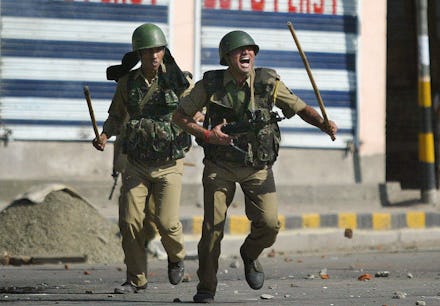'The Association of Small Bombs' Is a Riveting Look at the Tragedy of Terror

The first section of Karan Mahajan's novel The Association of Small Bombs is titled "Chapter 0," appropriately, because the bombing that ensues becomes the literal and figurative ground zero for all that happens after.
If a small bomb goes off and nobody cares, did it still happen? A blast by Kashmiri rebels in Delhi's Lajpat Nagar kills 13. As anyone acquainted with the terrifying banality with which we often respond to violence in the world today knows, a small bomb — or a small mass shooting, say — blows into the public consciousness only to fade away like a whisp of smoke.
But not for the victims. Enter Hindu couple Vikas and Deepa Khurana, who lose their two sons in the attack, young family friend Mansoor Ahmed, who gets injured alongside them, and a rotating cast of other POV characters including charismatic, complicated Muslim civil-rights activist Ayub. Through their stories, we see how varied perspectives can be on political violence.
Mahajan's story has much to say about survivors. Shrapnel from a small bomb sticks in more than the body, he writes, but cuts into the mind, causing hurt and fear and regret and guilt in a thousand ways. It writhes its way into dark recesses, and leaves scars deep beneath the skin. Having already been robbed of so much, more than one character finds themselves unwilling to let go of the pain left behind.
The explosion briefly draws the Khuranas together in grief, but ultimately exacerbates their own failings. Ahmed recovers only to find repetitive stress injuries from typing with healing extremities have ruined his dreams of becoming a programmer. "That's the meaning of having survived the bomb," he thinks to himself. "I didn't survive at all." The elder Ahmeds deal with their survivor's guilt by holding their son too close to home.
It also dives just as headily into the mind of the agents of terror themselves, their motivations — as political, if not much more so, than they are religious — and their various miseries and hypocrisies. Shockie, a career bombmaker with the Kashmir Islamic Force responsible for the original bombing, smokes and sleeps with prostitutes. Another character who becomes involved with the group commits monstrous acts of personal betrayal. Their ideology is primarily political, not religious, but the rage boils up from self-hatred as much as loyalty to their people.
Mahajan's story has much to say about survivors. Shrapnel from a small bomb sticks in more than the body, he writes, but cuts into the mind, causing hurt and fear and regret and guilt in a thousand ways.
This anger has roots in oppression and violence, and a recurring theme is the reactionary violence of Indian authorities, who wage their own campaign of state terrorism: torture, false confessions and random roundups of young Muslim men. The bombers are more than willing to return it in kind. Shockie, angered by the low number of casualties resulting from his bomb, fantasizes about blowing up the World Trade Center.
In another disconcerting chapter, a member of the Kashmiri group explains, "If you are worried about innocents, think about it this way — the fewer that die, the lonelier the victims are. It's better for the event to be so big, to affect so many. People say 9/11 was the worst terror attack of all time — was it? I think the small bombs that we hear about all the time, that go off in unknown markets, killing five or six, are worse. They concentrate the pain on the lives of a few. Better to kill generously rather than stingily."
Eventually, these worlds collide again, with yet more grim results. Bystanders are harmed, innocent and guilty are swept up in the tide and the survivors face fresh horrors. Idealism becomes a distant memory. Violence is a cycle, Mahajan suggests, and one we as victims and perpetrators are ill-equipped to stamp out. Anyone seeking an intimate understanding of the role terror plays in modern geopolitics can learn much from this riveting novel.
Read more: